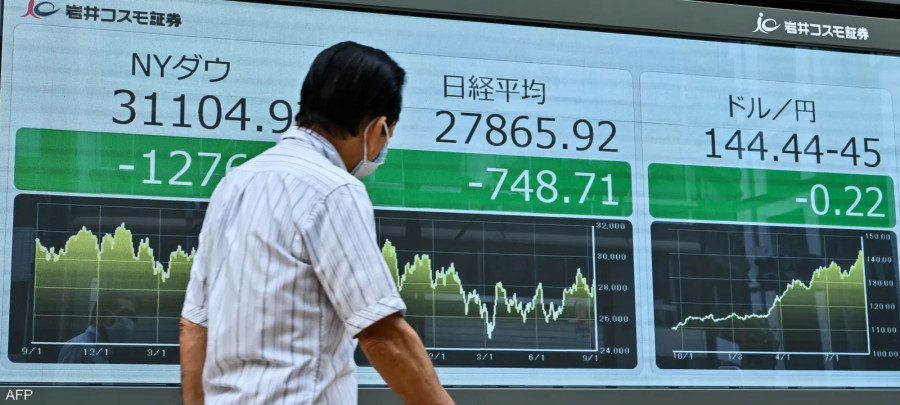Stocks and bonds in Asia were revised down on Tuesday, echoing moves in Europe, in a sign of waning risk appetite that has supported the dollar.
Stock indices in Japan, South Korea, Australia and Hong Kong fell, while US stock futures also fell. European stock futures fell, continuing their decline in the previous session, after European Central Bank officials backed away from bets on lowering interest rates.
Treasuries fell on their first trading day since Friday. Yields on 10-year bonds rose by about six basis points, while yields on two-year bonds, which are sensitive to monetary policy, rose by the same amount. Australian and New Zealand sovereign bonds also joined the selling wave.
The rise in US yields helped support the dollar, which strengthened its rise for the third session against major currencies. The South Korean won fell to a level not seen in a month against the dollar.
On the other hand, oil prices continued to decline on Monday, even as tensions continued in the Red Sea. Houthi militants hit a US-owned commercial ship with a ballistic missile yesterday, highlighting the dangers facing one of the world's most important trade routes. West Texas Intermediate crude oil was trading just above $72 per barrel, while Brent crude oil was trading at around $78.
Interest expectations
Despite the conflict that has led to the suspension of some Red Sea routes, global oil supplies have not been significantly affected, Saqib Iqbal, an analyst at Trading.Biz, said in a note. He added: The focus shifts to key economic data releases from the United States and China, providing valuable insights into potential demand.
In Germany, bonds fell on Monday, a decline that highlights the gap between market expectations for interest rate cuts from the European Central Bank and less optimistic expectations among economists. The market is pricing in about six cuts, while economists polled by Bloomberg see four cuts of 25 basis points as a more realistic scenario.
European Central Bank Governing Council member Robert Holzmann indicated in his statements on Monday that cuts this year are not guaranteed given the persistence of inflation and geopolitical risks. These sentiments echo ECB President Christine Lagarde's previous comments in warning that it is too early to talk about lowering borrowing costs.
China under the microscope
At the same time, China has remained firmly in the spotlight. The country is set to publish data showing improvements in gross domestic product, industrial production and retail sales on Wednesday, supported by a lower comparison base when pandemic restrictions have hampered economic activity. Some investors are also turning bullish on the country's faltering stock market.
Bell Asset Management Ltd shares, which have been trending down for a long time, are in the market's eye at the moment because they are so cheap, and Abrdn Plc is looking to invest in them through options.
“We have been neutral for the past three quarters, but now we are starting to focus on value,” said Louis Lu, head of multi-asset investment solutions for Greater China at Aberdeen. He added: We are thinking about buying some options that bet on the rise, if the stock market rises and is affected by the relative performance of emerging market funds.
As for other commodities, gold fell after a rise on Monday, and Bitcoin settled at around $42,500. European natural gas futures fell to the lowest level since August, underscoring the region's success in boosting supplies since the energy crisis in 2022.
In corporate news, Apple plans to remove the blood oxygen measurement feature from its latest smart watches to circumvent the US ban on the devices if the appeal of the decision fails.






































